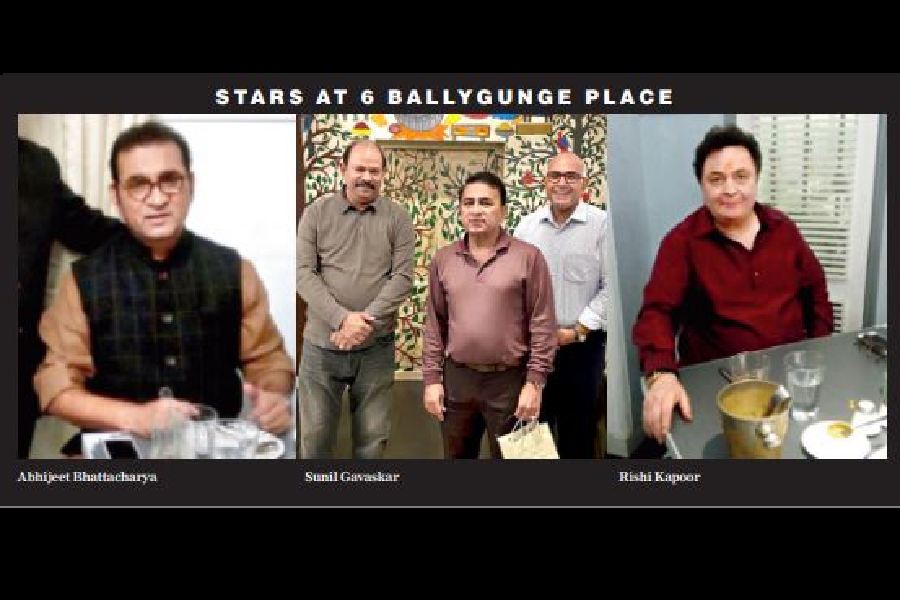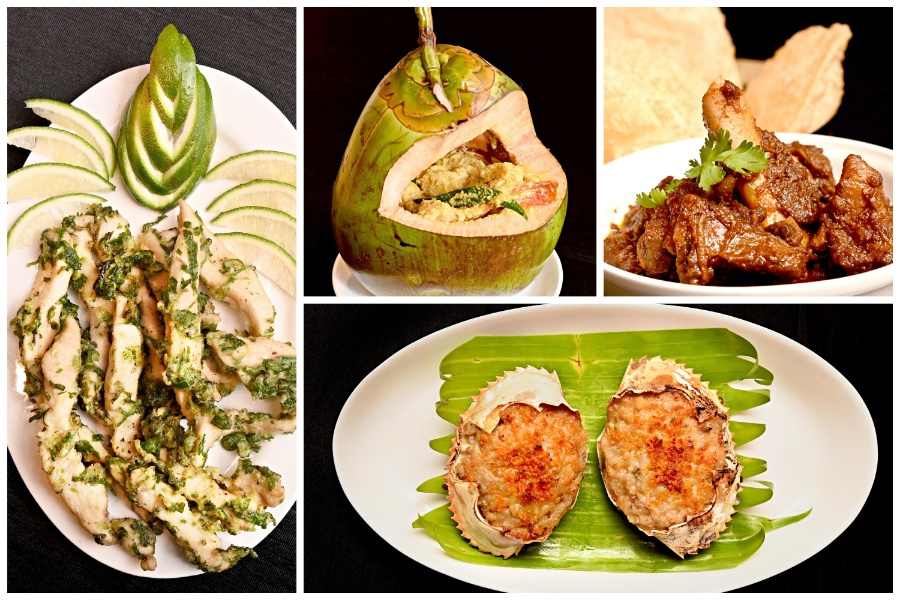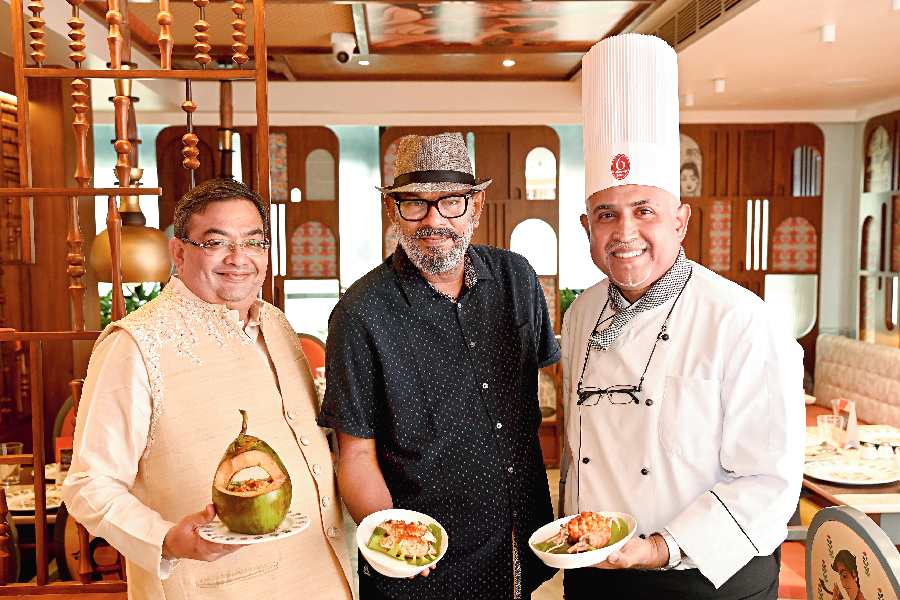There are real stories in this world that never stop inspiring. Stories that involve taking chances to know if you can make it big; stories that start with humble beginnings, sacrifices, struggles, failures, leading to experience the first taste of success and then never looking back. Such is the story of friends and business partners Aninda Palit, Swaminathan Ramani and Chef Sushanta Sengupta, who stepped out of their comfort zone to start a new endeavour, Savourites Hospitality Pvt Ltd, with just Rs 1 lakh as capital and ended up making it an almost Rs 100cr business now. On the occasion of Savourites completing a mammoth 25 years, TT sat down with the men behind the brand for an elaborate chat over delicious 6 Ballygunge Place food. Excerpts...
It’s been 25 years as company, as partners. So how did it all start?
Ramani: In 1998, Palit was a banquet manager, I was a banquet sales manager, Chef Sushanta was chef-in-charge of the Zen (at The Park). I had to put in my papers, and Palit said he would join me in resigning. We had overheard that chef was planning to start a new business. So we called him over to Palit’s house to discuss what he had on his mind. Then Palit made a proposal that we start together.
Palit: I know Sushanta from college. We were batchmates. Ramani was from Chennai. He was senior to us. When you are working in a hotel, you often put in 48-,72-hour shifts which become very difficult to continue after marriage. So, we were all thinking and decided to join together. At that point of time we had a fourth partner, Shubhankar Dhar.
Ramani: He was my friend Kanchan’s first cousin.
Palit: They had started an advertisement agency. Kanchan gave the name Savourites. That was the first meeting point. How we’ve been very lucky is that we have never had to hanker for business. Business came to us. We rustled up some food and catered to a party at his house for some 20 guests as a part of our first catering. Immediately after that we got a call from Carittmoran. They didn’t have a cook for a few months and wanted us to serve food for them.
What was the capital amount when you started?
Palit: When the four of us started off, our entire capital was Rs 1.1lakh.We started off Carittmoran from where our flagship outlet is now. The ground floor was empty; it belonged to my maternal uncle. Then, Sushanta’s father was kind enough to give us his ground floor, in Jodhpur Park.
Who was your first client and how much was your first paycheck?
Ramani: Vesuvius was the first one. Our first heft cheque was from Vesuvius, for Rs 1 lakh. With that we bought our first vehicle to deliver the food, a maroon Maruti van.
Palit: TCS was the first company in Sector V. Before that our main clients were from the Dalhousie area.
How did the catering take shape?
Palit: The first outdoor event we catered to was a wedding party for a friend’s friend in 1997-98. Most caterers start from scratch. You hire equipment, the cooks, and the service staff. We did the same. Chef was in charge of the hired cooks. He was not used to working with such an indisciplined lot. Chef decided he could not work with that. He needed a team of his own. Before Covid we had 225 personnel in our catering team alone. Unlike any other caterer, our kitchen team was always our own staff.
Sushanta: Even if we are engaged for 150 days a year, we have a catering staff whom we are paying salary 365 days.
Palit: Caterers generally cook at the venue. We developed a method where everything is cooked at our base kitchen and just heated up and served at the venue. Having interacted with the top caterers of that time, I realised that the food was very good. However, the presentation and the hygiene were lacking. We felt we could definitely improve on those and get five-star hygiene and presentation at an affordable price.
Chef invested in things which at the time were very expensive for us. In 2003, we got our vegetable-cutting machine which cost Rs 2.5 lakh. We also had a software where we made standard recipes for every item. Say we are making 500 portions of aloo posto, 300 portions of chholar dal, etc and the software would come out with the entire indent. This saved time and we became a champion of making food in high numbers.
When you have so many partners, there must have been moments when you have had conflict of ideas...
Palit: We always had one idea, which Ramani set rolling. We had decided to not go by a voting system. We will go by what we feel is the best idea and whoever can bring it forward as the best idea. A partnership is exactly like a marriage. There are parts where you compromise, you understand and highlight the positives of each other rather than dwell on the weakness. You don’t keep count of who has worked more. We also decided that irrespective of what the customer says, our internal criticism would be the most important.
In 25 years were there any goof-ups that happened?
Palit: Around 2007-08, I was on vacation. This lady client calls me up and tells me nobody has arrived at her venue till then. So I call up the salesperson in our team, and he tells me not to worry, the event is the next day. I ask him to double-check and he comes back and says he has made a mistake. I tell him to alert chef and I will try to manage the other end. The lady is in tears. Finally, in two-and-a-half hours since it was brought to our attention, we are at the venue with the food, before any guest has shown up.
Sushanta: Actually by that time, we already had a few restaurants. So we had support. What worked for us was we never hired staff. It was internal people whom we could activate in an emergency.
You guys also had a restaurant called Raga...
Palit: Our auditor showed us the place on Ganesh Chandra Avenue and we opened it in 2001.
Ramani: It was a 70-cover restaurant with peach and green colours; we had flown in expensive Magpie crockery and cutlery from Delhi. It had revolving doors, Italian wall windows but things didn’t work out because we had opened it way ahead of time.
Palit: We realised some restaurants do well from Day One. Some restaurants take time to gain popularity. We didn’t have deep pockets back then as we were running losses. If we had persisted with the restaurant, it would be one of the finest vegetarian restaurants in the city.
And how did the flagship outlet, 6 Ballygunge Place, happen?
Ramani: We had requested our mamas to vacate the place for us to run a restaurant. We convinced them that we would pay more than they would get if they rented it to strangers. Money would stay in the family only. So they agreed to it. But now the issue remained… what to open? We settled on Bengali.
How did the name come up?
Sushanta: The entire plot was 6 Ballygunge Place. We retained 6B, 6A was sold. The name also helped us a lot. Whenever restaurants in Calcutta were listed, our numerical names were featured first. Even in The Telegraph Food Guide, our name used to be first.
Ramani: Our restaurant is a case study in patent law. It is the first address in the world to have got a patent. So 6BP was a 72-cover restaurant opened in 2003.
Palit: We were not confident that just a Bengali restaurant would suffice. At that time Aheli was in a five-star hotel, there was Kewpie’s, there was Suruchi... so to be safe, we wanted a continental menu popular with Bengalis.
Sushanta: We continued with a continental menu for quite some time. In 2005, 6BP Bangalore opened with a continental menu. There are still some old-timers who mention whole-baked fish and pork chops.
Palit: But we realised more than 80 per cent of the orders were Bengali, hence we decided to shut that off and open another continental restaurant called Comics.


It was a lovely restaurant near Menoka in 2006-07, but at the wrong time unfortunately.
Ramani: 6BP Bangalore made us world famous. We had massive queues on the weekends. It typically takes 18-24 months to break even with a new restaurant. With 6BP Bangalore, we broke even in 14 months. Our restaurant was in Indiranagar and we had customers from Sarjapur and Whitefield.
Palit: After nine years of operation, the landlord wanted to demolish the building and build a bigger one. We found a new location three-four blocks down but it never took off. Apparently, the place had bad Vastu so that was the end of it.
In these 25 years, do you have any funny incident or memory of a customer?
Palit: A gentleman and his wife used to come once a month to the flagship store with their own plate. They used to go up to the buffet and he used to take the entire serving of say fish item in one go. It was a huge plate. Then they used to attack the mutton with similar gusto.
Sushanta: A normal plate is 11”. The plate they brought was at least 16”.
Palit: We used to know he has visited when we used to review the food costs and see the sudden spike for that particular day. Finally we had to deny admission to him. Else he would have eaten us to bankruptcy.
Sushanta: The major irritant was that he would serve himself the head of the mishti doi. After emptying his plate he would go back and ask for a fresh pot (bhar) of mishti doi as he only has the head. I don’t think any restaurant has instructed their staff to deny admission to customers with their own crockery. But because of this person, we had to tell our staff. It had so happened that a gentleman had come with a baul singer. He spoke with an accent and my staff thought he is coming in with a bowl and entry was denied to this person. (Laughs)
What has been the biggest learning over the last 25 years?
Sushanta: The customers have always helped us in developing the cuisine we have been serving at 6BP. We have been very receptive to the customers’ comments. There was a lady who we were catering for who invited us to her house to show what kind of daab chingri she wanted at her event. That is the daab chingri we serve at our brand. Bengali cookbooks were nonexistent back then. Palit’s father told us about a cookbook written by Rabindranath Tagore’s niece Pragyasundari Debi. Some of our very popular items such as Aam Aada Diye Moong Dal, Chingri Macher Chine Kebab, Badam Bata Mach Bhaja have drawn inspiration from there. My Oriental kitchen background helped me to come up with a few dishes too. Like the Gondhoraj Fried Chicken used to be called the Hunan Fried Chicken.
Palit: I feel business gives you the ability to take risks. When we opened our first restaurant, we were scared to take loans because we did not know what the future holds. Today, as we are expanding, we are taking huge bank loans and we are doing it confidently because we know we have the ability to repay them.You will not always be right. Doing business, there is somewhere you will go wrong and fail. How you bounce back is what is most important. Also, the importance of good and loyal staff who are always by your side. We have been very lucky that way.
Ramani: You focus on a customer’s life cycle. Right from their wedding to their griho probesh to their child’s mukhe bhaat, you are there for all major events. You don’t invent new customers. You maintain your customers.
6 Ballygunge Place is a favourite with many stars visiting Calcutta...
Palit: Vidya Balan had come to our flagship store when shooting for Kahaani 2. The restaurant was closed that day because of by-elections. The Salt Lake restaurant was open. She took the address of the Salt Lake outlet and went there. She came back the next day to eat again. That gesture was such an accolade to me. She has come back with her husband multiple times since then.
Palit: Ranbir Kapoor. Every time he is at The Oberoi Grand, the food goes from here. He loves the mishti doi. Then Asha Bhosle, she had started asking me very pertinent questions about the food and its preparation. I later came to know she is a restaurateur herself.
Sushanta: Rishi Kapoor had ordered each of the 17 fish items we had on the menu at our flagship store.
Ramani: Sunil Gavaskar, Kapil Dev, Brett Lee, and so many other celebrities. We have also done catering for Tolly celebs like Gaurav Chakrabarty and Ridhima Ghosh, and Koel Mallick’s weddings.
How had Covid impacted your business?
Sushanta: The way we have dealt with Covid is a revelation for us. We created a separate vertical altogether called 6 Ballygunge Place Takeaway. We started off with five counters and now we have 17 of them.
Ramani: We also commissioned 6 Ballygunge Place Chowringhee and Ramanee and this outlet (Salt Lake) during Covid.
Sushanta: As we speak there are two projects...
Ramani: We are opening a banquet and 6BP Thali at Kamalgazi and coming up with 6BP Multicuisine (South Indian, Bengali and North Indian) in Kolaghat.
Is there anything left to achieve?
Palit: Bengali cuisine is huge. We have just touched one part of it. Our aim right now is to make Bengali cuisine global. We would also like to take the brand outside India. We have been approached by Bongo Utsab 2024 in Chicago to cater at the event.
Ramani: I have a vision... one day, every spectator who goes inside the Eden Gardens, gets a box of biryani. My idea is to meet Shah Rukh Khan and propose KKR ticket ke saath biryani. Main karke dikhaunga.
Is there any change or trend you have seen over the years?
Palit: When we started our catering, that time the demand was for Vietnamese, Lebanese, Thai counters, but now, when we go to any household for a private party, their children are in different cities, so when they come back, they want to have Bengali cuisine specifically. That for me is a very big change. Back in the years, any bonedi household would want golda chingri on the menu, but now it is not a must. Not to forget the entire set-up has changed from a sit-down dinner to a buffet.
After so much of food talk, if you had to describe each other as a dish, what would it be?
Ramani: Chef Sushanta is like Kosha Mangsho — everything put in raw, but the flavours are fantastic.
Sushanta: Ramani is like Gondhoraj Fried Chicken — very easy curated dish but the ultimate result is awe-inspiring.
Palit: Chef is like a Fish Fry — the best!
Ramani: Palit is like a continental dish, Chicken A-la-Kyiv — a difficult dish, but juicy inside. Palit has got a very big heart and is hard to please easily.
